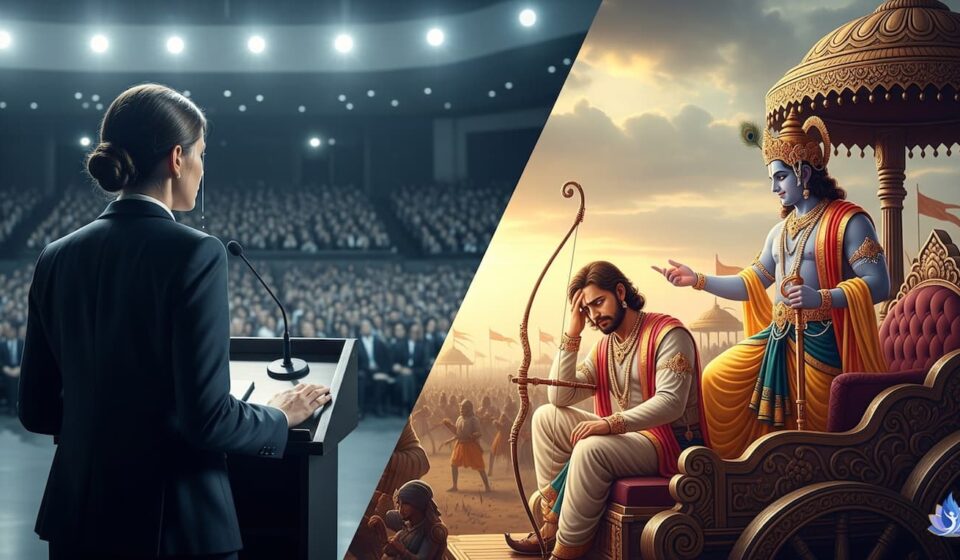That Moment When You Just… Freeze
Table Of Content
You’ve prepared for weeks. You know your stuff inside and out. You step up to the podium, walk into the interview room, or pick up the phone to have that conversation you’ve been dreading. And then… nothing.
Your mind goes blank. Your heart hammers against your ribs. Your palms get slick with sweat. It feels like every ounce of courage and confidence has evaporated, leaving you utterly paralyzed by fear.
We’ve all been there. It’s the moment when the fear of failure, of judgment, of the unknown becomes so overwhelming that it shuts us down completely. We tell ourselves to “be brave” or “push through,” but it feels like trying to reason with a tidal wave.
What if the most effective strategy for overcoming fear wasn’t about fighting it, but about understanding it from a completely different perspective? What if a 5,000-year-old conversation between a terrified warrior and his divine guide held the key to unlocking unshakable courage in your own life?
The Greatest Warrior’s Moment of Paralysis
On the battlefield of Kurukshetra, Arjuna, the most skilled archer of his generation, was about to face the fight of his life. But when he saw his own family—his cousins, teachers, and friends—in the opposing army, he didn’t feel the fire of a warrior. He felt the ice of despair.
He was overcome by a profound fear—not of dying, but of the devastating consequences of his actions. He dropped his bow, his body trembling, and told his charioteer, Lord Krishna, “I will not fight.”
In that moment of crisis, Arjuna became the ultimate symbol of every human being who has ever been frozen by fear. His breakdown wasn’t a sign of weakness; it was a sign of his humanity. And Krishna’s response wasn’t a simple pep talk; it was a masterclass in the psychology of fear.
Krishna’s Two-Step Cure for Fear
Krishna understood that fear takes root when we identify completely with our temporary, fragile selves—our bodies, our egos, our emotions. To become fearless, we need to remember who we truly are and shift our focus to what we’re truly here to do.
Step 1: Remember That Your True Self Is Fearless. Krishna’s first lesson was a radical truth: your true essence, the soul (Atman), is eternal, indestructible, and unchangeable. It cannot be harmed, broken, or destroyed. The fear you feel is a reaction of the body and mind, but it has no power over the real you.
Step 2: Focus Only on Your Duty (Dharma). Once you’re grounded in that truth, the next step is practical. Stop obsessing over the terrifying “what ifs” of the future. You cannot control the outcome. Your only job is to perform your duty—the right action in this moment—with full commitment and integrity.
Wisdom in Verse: The Ancient Blueprint for Courage
These two principles form a powerful blueprint for facing any fear. First, the philosophical truth to ground you, and second, the practical instruction to guide your action.
First, Krishna reminds Arjuna of his immortal nature:
अव्यक्तोऽयमचिन्त्योऽयमविकार्योऽयमुच्यते | तस्मादेवं विदित्वैनं नानुशोचितुमर्हसि ||
Avyakto ’yam acintyo ’yam avikāryo ’yam ucyate, Tasmād evaṁ viditvainaṁ nānuśocitum arhasi.
(Bhagavad Gita, Chapter 2, Verse 25)
Translation: “The soul is spoken of as invisible, inconceivable, and unchangeable. Knowing this, you should not grieve for the body.”
This is the ultimate anchor. When you remember that the real you is beyond harm, fear loses its sting. It becomes just a sensation, not a threat to your existence.
Then, Krishna gives the practical tool for action:
कर्मण्येवाधिकारस्ते मा फलेषु कदाचन। मा कर्मफलहेतुर्भूर्मा ते सङ्गोऽस्त्वकर्मणि॥
Karmaṇyevādhikāraste mā phaleṣu kadācana, Mā karmaphalaheturbhūrmā te saṅgo’stvakarmaṇi.
(Bhagavad Gita, Chapter 2, Verse 47)
Translation: “You have a right to perform your prescribed duties, but you are not entitled to the fruits of your actions. Never consider yourself the cause of the results, nor be attached to inaction.”
This is liberating. It takes the crushing weight of the outcome off your shoulders. Your only task is to show up and do the next right thing.
How to Face Your Fears, the Gita Way
The next time you feel that familiar chill of fear, don’t just try to fight it. Try this instead:
- Acknowledge the Fear, Then Zoom Out: Notice the fear in your body—the tight chest, the racing thoughts. Acknowledge it. Then, remind yourself: “This is a reaction of my mind and body. My true self is separate from this, and it is safe.”
- Identify Your One Right Action: Forget the entire scary scenario. What is the single, smallest, most immediate action that your duty requires of you right now? Is it to say the first word? To send the email? To take one step forward?
- Pour Yourself into That One Action: Focus all your energy on executing that one small step with as much presence and integrity as you can. Don’t think about the step after that, or the result, or what people will think. Just do this one thing.
Courage Isn’t the Absence of Fear
Arjuna didn’t magically stop feeling fear. He was given a purpose so profound and a truth so deep that it became more powerful than his fear. He picked up his bow not because he was no longer afraid, but because he understood his duty was more important.
Courage isn’t about being fearless. It’s about acting from a place of purpose, even when your hands are trembling. And that is a power you can access in any moment.
What is one fear that has been holding you back?
How can you apply this two-step process of remembering your true self and focusing on your next right action? Share your thoughts in the comments below!
If this article gave you a little more courage, share it with someone who needs it. And subscribe for more timeless wisdom to help you live a braver, more peaceful life.

